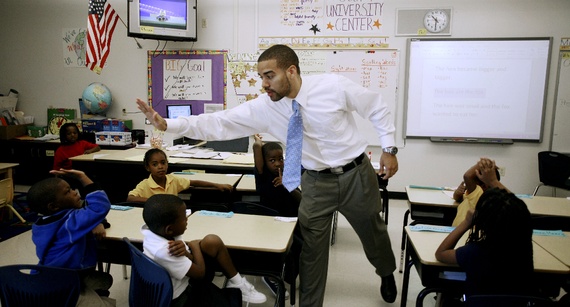By ANDREW J. COULSON (Originally published Sept. 2012)
That’s a question I was asked this morning by a reporter. Interesting as it seems, it misses the real impact that teachers unions have on American education: protecting the public school monopoly from private sector competition.
Average compensation for public school teachers is $17,000 higher than for their private sector peers. That’s despite the fact that private schools perform as well or better academically and have higher graduation and college matriculation rates (after taking student/family background and other differences between sectors into account). So public schools offer generally inferior outcomes at a roughly 50% cost premium over independent schooling.
Were it not for the relentless and historically highly effective campaigning of teachers’ unions, it is hard to imagine that the public would have so long perpetuated the public school monopoly. At the federal level, public school employee unions contribute as much as Chevron, Exxon Mobil, the NRA, and Lockheed Martin combined—$56 million between 1989 and 2010.
But that figure pales in comparison to what teachers’ unions spend protecting their government monopoly at the state level. They spent $55 million in California alone—in a single year—fighting then-governor Schwarzenegger’s 2005 reform initiatives. During the 2006–07 school year, the NY state teachers union spent $571,012 at a single luxury hotel, the Desmond, near the statehouse in Albany.
This lobbying is to protect union members from competition by preventing American families from easily accessing independent, non-unionized, alternatives. The teachers’ unions lobby against charter schools, vouchers, and education tax credit programs that make private schooling affordable to lower and middle income families. And while the unions have lost a few high profile battles in the past year, the vast majority of American children are still assigned to a government school, based on where they live, by bureaucrats who have never met them.
It is a system that only makes sense if the goal of public education is to create a protected class of government employees. If we want a system that will serve the needs of children, then all schools should have to compete for the privilege of serving each and every student, and their revenues should depend on parents’ estimation of the quality of that service… just as happens right now in the vastly more efficient and responsive independent education sector.

Public teachers have to teach all students who walk thru the school doors. Private schools can pick and choose students. The problems are less severe in private schools than public schools. Also don’t forget that public teachers such as math teachers could easily go into other fields like engineering and make 75% more money than teaching. If you don’t pay teachers people won’t go into teaching. In my graduation class their were 1500 teachers. When people like you started demonizing teachers within 2yrs the graduating class dropped to 700 teachers and teachers salaries increased. Remember the market will dictate due to supply and demand according to economist adam smith in the 15th century. Its called supply and demand not supply side economics. It applies to all activities.